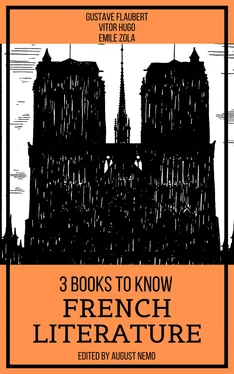A word may be added to explain how this translation fell to the lot of one whose work has been in other fields. In 1893 the late A. Texeira de Mattos was arranging for private issue a series of complete versions of some of Zola's chief novels and offered to assign Germinal to me. My time was taken up with preliminary but as yet unfruitful preparation for what I regarded as my own special task in life, and I felt that I must not neglect the opportunity of spending my spare time in making a modest addition to my income. My wife readily fell into the project and agreed, on the understanding that we shared the proceeds, to act as my amanuensis. So, in the little Cornish cottage over the sea we then occupied, the evenings of the early months of 1894 were spent over Germinal, I translating aloud, and she with swift efficient untiring pen following, now and then bettering my English dialogue with her pungent wit. In this way I was able to gain a more minute insight into the details of Zola's work, and a more impressive vision of the massive structure he here raised, than can easily be acquired by the mere reader. That joint task has remained an abidingly pleasant memory. It is, moreover, a satisfaction to me to know that I have been responsible, however inadequately, for the only complete English version of this wonderful book, 'a great fresco,' as Zola himself called it, a great prose epic, as it has seemed to some, worthy to compare with the great verse epics of old.
––––––––
––––––––

Over the open plain, beneath a starless sky as dark and thick as ink, a man walked alone along the highway from Marchiennes to Montsou, a straight paved road ten kilometres in length, intersecting the beetroot fields. He could not even see the black soil before him, and only felt the immense flat horizon by the gusts of March wind, squalls as strong as on the sea, and frozen from sweeping leagues of marsh and naked earth. No tree could be seen against the sky, and the road unrolled as straight as a pier in the midst of the blinding spray of darkness.
The man had set out from Marchiennes about two o'clock. He walked with long strides, shivering beneath his worn cotton jacket and corduroy breeches. A small parcel tied in a check handkerchief troubled him much, and he pressed it against his side, sometimes with one elbow, sometimes with the other, so that he could slip to the bottom of his pockets both the benumbed hands that bled beneath the lashes of the wind. A single idea occupied his head—the empty head of a workman without work and without lodging—the hope that the cold would be less keen after sunrise. For an hour he went on thus, when on the left, two kilometres from Montsou, he saw red flames, three fires burning in the open air and apparently suspended. At first he hesitated, half afraid. Then he could not resist the painful need to warm his hands for a moment.
The steep road led downwards, and everything disappeared. The man saw on his right a paling, a wall of coarse planks shutting in a line of rails, while a grassy slope rose on the left surmounted by confused gables, a vision of a village with low uniform roofs. He went on some two hundred paces. Suddenly, at a bend in the road, the fires reappeared close to him, though he could not understand how they burnt so high in the dead sky, like smoky moons. But on the level soil another sight had struck him. It was a heavy mass, a low pile of buildings from which rose the silhouette of a factory chimney; occasional gleams appeared from dirty windows, five or six melancholy lanterns were hung outside to frames of blackened wood, which vaguely outlined the profiles of gigantic stages; and from this fantastic apparition, drowned in night and smoke, a single voice arose, the thick, long breathing of a steam escapement that could not be seen.
Then the man recognized a pit. His despair returned. What was the good? There would be no work. Instead of turning towards the buildings he decided at last to ascend the pit bank, on which burnt in iron baskets the three coal fires which gave light and warmth for work. The labourers in the cutting must have been working late; they were still throwing out the useless rubbish. Now he heard the landers push the wagons on the stages. He could distinguish living shadows tipping over the trams or tubs near each fire.
"Good day," he said, approaching one of the baskets.
Turning his back to the fire, the carman stood upright. He was an old man, dressed in knitted violet wool with a rabbit-skin cap on his head; while his horse, a great yellow horse, waited with the immobility of stone while they emptied the six trains he drew. The workman employed at the tipping-cradle, a red-haired lean fellow, did not hurry himself; he pressed on the lever with a sleepy hand. And above, the wind grew stronger—an icy north wind—and its great, regular breaths passed by like the strokes of a scythe.
"Good day," replied the old man. There was silence. The man, who felt that he was being looked at suspiciously, at once told his name.
"I am called Étienne Lantier. I am an engine-man. Any work here?"
The flames lit him up. He might be about twenty-one years of age, a very dark, handsome man, who looked strong in spite of his thin limbs.
The carman, thus reassured, shook his head.
"Work for an engine-man? No, no! There were two came yesterday. There's nothing."
A gust cut short their speech. Then Étienne asked, pointing to the sombre pile of buildings at the foot of the platform:
"A pit, isn't it?"
The old man this time could not reply: he was strangled by a violent cough. At last he expectorated, and his expectoration left a black patch on the purple soil.
"Yes, a pit. The Voreux. There! The settlement is quite near."
In his turn, and with extended arm, he pointed out in the night the village of which the young man had vaguely seen the roofs. But the six trams were empty, and he followed them without cracking his whip, his legs stiffened by rheumatism; while the great yellow horse went on of itself, pulling heavily between the rails beneath a new gust which bristled its coat.
The Voreux was now emerging from the gloom. Étienne, who forgot himself before the stove, warming his poor bleeding hands, looked round and could see each part of the pit: the shed tarred with siftings, the pit-frame, the vast chamber of the winding machine, the square turret of the exhaustion pump. This pit, piled up in the bottom of a hollow, with its squat brick buildings, raising its chimney like a threatening horn, seemed to him to have the evil air of a gluttonous beast crouching there to devour the earth. While examining it, he thought of himself, of his vagabond existence these eight days he had been seeking work. He saw himself again at his workshop at the railway, delivering a blow at his foreman, driven from Lille, driven from everywhere. On Saturday he had arrived at Marchiennes, where they said that work was to be had at the Forges, and there was nothing, neither at the Forges nor at Sonneville's. He had been obliged to pass the Sunday hidden beneath the wood of a cartwright's yard, from which the watchman had just turned him out at two o'clock in the morning. He had nothing, not a penny, not even a crust; what should he do, wandering along the roads without aim, not knowing where to shelter himself from the wind? Yes, it was certainly a pit; the occasional lanterns lighted up the square; a door, suddenly opened, had enabled him to catch sight of the furnaces in a clear light. He could explain even the escapement of the pump, that thick, long breathing that went on without ceasing, and which seemed to be the monster's congested respiration.
Читать дальше













